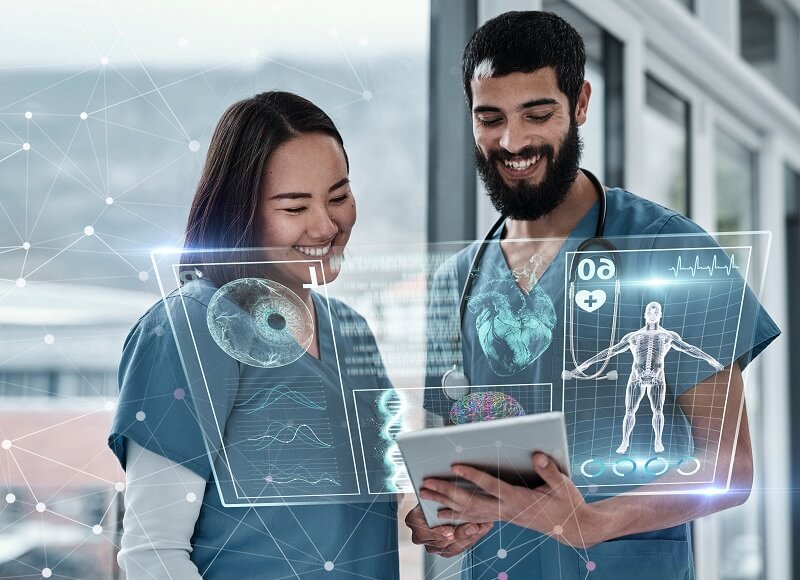
Nursing has long been a respected career path. Year after year, they top Gallup’s Honesty and Ethics poll as the most trusted profession – and for good reason. Nurses provide incredible value to communities, providing compassionate care and attending to each patient with professionalism and precision. You may picture a hospital or a doctor’s office when you think of nurses. In reality, registered nurses work in a wide variety of settings, using their expertise to serve people and improve patient outcomes.
The intersection of artificial intelligence and nursing is already changing the field of medicine, and further advances are sure to bring further shifts. AI technology will transform the field of nursing, and with that comes a level of wariness for some. But there’s good news: this partnership between technology and people could bring significant innovation to patient care and support nurses as they continue to do valuable work with an irreplaceable human touch.
How AI is Used in Healthcare Today
Nurses in hospitals and various other healthcare settings are already using artificial intelligence. Using AI in nursing has helped medical professionals save time, improve accuracy, and automate routine tasks, allowing nurses to focus on the more complex aspects of their job.
To understand the usage of artificial intelligence in the medical field, it’s essential to know the difference between predictive AI and generative AI. Generative AI is trained to create new content by “learning” from vast amounts of existing information. Predictive AI is trained to forecast trends or predict the likelihood of an outcome based on a specific set of historical data. Most current artificial intelligence tools in nursing utilize predictive AI. This is known as machine learning, and its implementation in healthcare has already proven immensely helpful.
For example, by using a person’s medical history, predictive models can indicate patients with a high likelihood of deteriorating during their hospital stay. Nurses can then use this information to be prepared for prompt intervention, thereby improving the patient’s outcome. Artificial intelligence is also used to help patients take the proper medications at the right time, create schedules for large hospitals with many departments and employees to manage, and allocate resources where they’re most needed in a crisis.
AI Outlook in Nursing: 2025 and Beyond
As we’ve already seen in the current landscape, artificial intelligence and nursing work well together. Working as an RN in 2025 and beyond will mean embracing the role of AI in healthcare. As technology continues to advance, future nurses have an exciting opportunity to learn how these tools can help them serve patients even better. There is no way to be sure how these technological advances will change the profession, but expert research has already shown promising results in many applications.

7 Ways AI Could Transform the Nursing Profession
1. Patient Monitoring
Some patients need to monitor a specific condition or their overall health even when they aren’t in the hospital or at an appointment. Remote patient monitoring (RPM) technology allows doctors and nurses to see important patient health data through digital devices. Most people are already familiar with many of their functions, from heart rate and blood sugar monitoring to at-home testing.
These tools are already in place in many healthcare settings, but AI will revolutionize this tool by interpreting and synthesizing data from RPM devices. This will predict complications and flag patients who need immediate intervention, allowing nurses and other healthcare professionals to implement the necessary interventions to mitigate adverse events.
2. Data Entry and Documentation
Nurses must spend a significant portion of their shifts documenting details for each of their patients such as medication dispensation, vital signs, and care plans. Studies have shown that most nurses spend between 25-40% of their time updating patient information and entering data.
Artificial intelligence has incredible data entry and documentation abilities. When implemented correctly, this technology is certain to give nurses minutes, if not hours, back each day. In turn, this will allow medical professionals to spend more time with patients, providing a better experience for everyone.
3. Robotic Process Automation (RPA)
AI has the ability to revolutionize the nursing profession not by taking away the human connection that nurses provide, but by filling in gaps with other tasks so that nurses can truly focus on patient care. Robotic process automation uses software robots to assist with administrative tasks – and they can do much more than simple data entry.
As RPA software continues to be optimized for healthcare, AI can assist with countless tasks, including:
- Patient registration
- Insurance documentation
- Scheduling and patient reminders
- Patient chart documentation
- Billing and processing
- Data migration
These tools will help nurses, doctors, and administrative staff in healthcare settings streamline their processes and improve patient experience, minimizing the hassle of paperwork for all involved.
4. Medication Management
In many cases, medication is an essential part of patient care, but the margin for error is wide. Nurses must ensure that patients receive the proper medication in the correct dosage at the right time, and then document it all correctly on the patient’s chart. Matters can be complicated further if healthcare professionals don’t have access to a patient’s medication list or medical history at the time of treatment.
Artificial intelligence seeks to minimize medication errors by compiling a complete and accurate medication list for patients with a simple click. This AI powered medication reconciliation keeps nurses from spending time on the phone tracking down health records and from manual data entry about dosages, schedules, and medicinal routes. This tool streamlines tasks, but it also can save lives by reducing errors in medication administration.
5. Virtual Nursing Assistants
Many healthcare artificial intelligence tools use predictive AI, but there is also room for generative AI in the future of healthcare. AI-powered virtual assistants can provide a pleasant patient intake experience while minimizing the questions providers must ask when they step into a room.
Virtual nursing assistants can track patient symptoms, compile their current medication lists, and manage appointment schedules, which frees nurses up to focus on personalized patient care when they enter a room. Receptivity to this technology is encouraging, with one study showing that 64% of patients would accept virtual care for administrative tasks and symptom tracking.
6. Personalized Care Plans
Every patient wants to feel as though they are a valued person and not just a number in a vast healthcare system. Ironically, artificial intelligence can create a more personalized human healthcare experience. AI’s ability to learn continuously means that its predictions will continue to grow in both accuracy and individualization.
Incorporating AI tools into patient care plans allows for quick analysis of a wide range of data, from patient demographics and comorbidities to prior treatment responses and healthcare preferences. While AI can assist in valuable ways, it will never replace the assessments, critical thinking and personal interactions completed by nursing and other health professionals. Instead, AI and healthcare providers can work together, creating a treatment plan that is unique as the individual who requires it.
7. Improved Clinical Decision Support Systems (CDSS)
Clinical decision support systems have been around since the 1980s. They provide valuable information to providers as they seek to make decisions that create the best patient outcomes. A CDSS includes information like:
- Treatment protocols
- Medication information
- Patient data
- Electronic health records
- Diagnostic options
- Treatment plans
A CDSS is already an invaluable database for nurses and other healthcare professionals, but AI could turn it into the ultimate tool for diagnostics and treatment alike. As nurses and other medical professionals identify, implement and evaluate the care they provide to patients, artificial intelligence can create a comprehensive strategy that saves time, offers statistical insights, and helps nurses administer care with compassion and excellence.
Why It’s a Great Time to Become a Nurse
It’s always a great time to consider a shift to the nursing field, but now, your compassionate care is needed more than ever. The current nursing shortage, combined with increased demand for primary care and an aging population that requires complex care, means that many roles will become available for excellent nurses nationwide, including here in Pennsylvania.
As artificial intelligence and nursing continue to intersect, nursing students need to keep pace with both today’s digital world and the AI of tomorrow. For prospective future nurses, an online learning environment can provide the skills required to enter the nursing field with confidence.
Earn Your BSN Online through Holy Family University
If you already hold a bachelor’s degree, the Accelerated BSN at HFU will help you enter your nursing career in just 14 months of full-time dynamic learning. You’ll complete your coursework 100% online along with an in-person residency, and Holy Family’s clinical placement support will help you find a rotation near your home community. These clinical hours allow you to complete your education with real-world experience in a healthcare setting.
At Holy Family, you’ll find just five required prerequisite courses and affordable tuition costs, so there’s nothing holding you back from your calling to care for others and promote positive outcomes for patients in your community.
The Second Degree Distance Hybrid BSN at Holy Family University prepares dedicated second-career nurses in Pennsylvania for a bright future in healthcare. Access your digital program guide to discover how earning your BSN at HFU could be your best next step.

